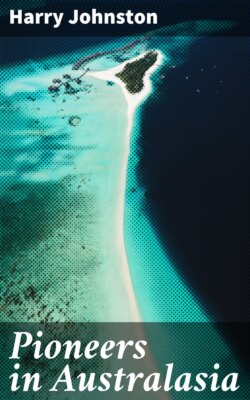Читать книгу Pioneers in Australasia - Harry Johnston - Страница 3
На сайте Литреса книга снята с продажи.
PREFACE
ОглавлениеTable of Contents
I have been asked to write a series of works which should deal with "real adventures", in parts of the world either wild and uncontrolled by any civilized government, or at any rate regions full of dangers, of wonderful discoveries; in which the daring and heroism of white men (and sometimes of white women) stood out clearly against backgrounds of unfamiliar landscapes, peopled with strange nations, savage tribes, dangerous beasts, or wonderful birds. These books would again and again illustrate the first coming of the white race into regions inhabited by people of a different type, with brown, black, or yellow skins; how the European was received, and how he treated these races of the soil which gradually came under his rule owing to his superior knowledge, weapons, wealth, or powers of persuasion. The books were to tell the plain truth, even if here and there they showed the white man to have behaved badly, or if they revealed the fact that the American Indian, the Negro, the Malay, the black Australian was sometimes cruel and treacherous.
A request thus framed was almost equivalent to asking me to write stories of those pioneers who founded the British Empire; in any case, the volumes of this series do relate the adventures of those who created the greater part of the British Dominions beyond the Seas, by their perilous explorations of unknown lands and waters. In many instances the travellers were all unconscious of their destinies, of the results which would arise from their actions. In some cases they would have bitterly railed at Fate had they known that the result of their splendid efforts was to be the enlargement of an empire under the British flag. Perhaps if they could know by now that we are striving under that flag to be just and generous to all types of men, and not to use our empire solely for the benefit of English-speaking men and women, the French who founded the Canadian nation, the Germans and Dutch who helped to create British Africa, Malaysia, and Australia, the Spaniards who preceded us in the West Indies and in New Guinea, and the Portuguese in West, Central, and East Africa, in Newfoundland, Ceylon, and Malaysia, might—if they have any consciousness or care for things in this world—be not so sorry after all that we are reaping where they sowed.
It is (as you will see) impossible to tell the tale of these early days in the British Dominions beyond the Seas, without describing here and there the adventures of men of enterprise and daring who were not of our own nationality. The majority, nevertheless, were of British stock; that is to say, they were English, Welsh, Scots, Irish, perhaps here and there a Channel Islander and a Manxman; or Nova Scotians, Canadians, and New Englanders. The bulk of them were good fellows, a few were saints, a few were ruffians with redeeming features. Sometimes they were common men who blundered into great discoveries which will for ever preserve their names from perishing; occasionally they were men of Fate, predestined, one might say, to change the history of the world by their revelations of new peoples, new lands, new rivers, new lakes, snow mountains, and gold mines. Here and there is a martyr like Marquette, or Livingstone, or Gordon, dying for the cause of a race not his own. And others again are mere boys, whose adventures come to them because they are adventurous, and whose feats of arms, escapes, perils, and successes are quite as wonderful as those attributed to the juvenile heroes of Marryat, Stevenson, and the author of The Swiss Family Robinson.
I have tried, in describing these adventures, to give my readers some idea of the scenery, animals, and vegetation of the new lands through which these pioneers passed on their great and small purposes; as well as of the people, native to the soil, with whom they came in contact. And in treating of these subjects I have thought it best to give the scientific names of the plant or animal which was of importance in my story, so that any of my readers who were really interested in natural history could at once ascertain for themselves the exact type alluded to, and, if they wished, look it up in a museum, a garden, or a natural history book.
I hope this attempt at scientific accuracy will not frighten away readers young and old; and, if you can have patience with the author, you will, by reading this series of books on the great pioneers of British West Africa, Canada, Malaysia, West Indies, South Africa, and Australasia, get a clear idea of how the British Colonial Empire came to be founded.
You will find that I have often tried to tell the story in the words of the pioneers, but in these quotations I have adopted the modern spelling, not only in my transcript of the English original or translation, but also in the place and tribal names, so as not to puzzle or delay the reader. Otherwise, if you were to look out some of the geographical names of the old writers, you might not be able to recognize them on the modern atlas. The pronunciation of this modern geographical spelling is very simple and clear: the vowels are pronounced a = ah, e = eh, i = ee, o = o, ô = oh, ō = aw, ö = u in 'hurt', and u = oo, as in German, Italian, or most other European languages; and the consonants as in English.
H.H. JOHNSTON.
